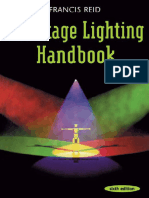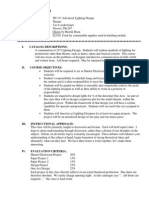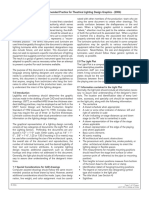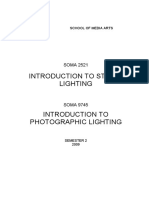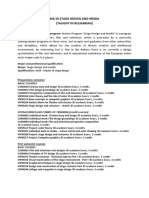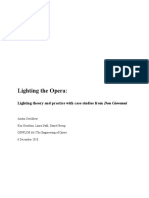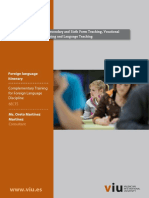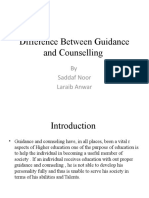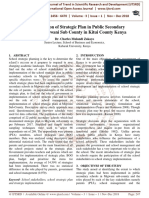Course
Requirements
and
Descriptions
Program
of
Study:
Lighting
Design
Topics
covered
in
Design
Studio
may
include:
devising
performance,
designing
new
work,
designing
installation,
designing
for
Design
Studio
1
(Year
1,
2
Semesters)
architecture,
environment,
visual
storytelling,
practical
and
Includes
Drawing
Lab.
The
first
year
is
spent
in
Studio
1
with
technical
application
of
design
ideas,
creative
problem
solving,
all
new
designers
and
directors.
presentation
skill-‐building,
collaboration,
critical
thinking,
engineering
and
constructing
LED
lightscapes.
Studio
Courses
(6
Each
semester
of
Lighting
Design
may
include:
the
development
of
Semesters)
lighting
schemes
for
theatre
in
conventional
and
non-‐conventional
venues,
opera,
film,
television,
installation,
architecture,
large
Lighting
Design
(4
semesters)
(including
Drawing
Lab).
The
events,
gaming
and
entertainment
design.
Lighting
Design
studio
focuses
on
the
development
of
skills
and
artistry
directly
related
to
the
work
of
a
lighting
designer.
Emphasis
is
placed
on
the
communication
of
designs
with
the
use
of
conventional
and
advanced
technological
lighting
fixtures
using
rendering
techniques
which
include
traditional
2D
and
3D
digital
plots,
models
and
pre-‐visualization
storyboards.
The
student
may
select
from
choices
in
many
alternate
areas
such
as
projection
design,
scene
painting,
game
design,
costume
design,
scenic
design,
audio
design,
writing,
Specific
course
examples
include
Lighting
Design
Skills,
Color
in
pedagogy
and
pre-‐visualization. Design,
Scene
Painting,
Projection
Design,
Digital
Pre-‐visualization,
Skill-‐Building
Courses
Vectorworks,
Interactive
Media
and
Game
Design,
Digital
(6
Semesters)
Production
Art,
Game
Development,
Capstone,
Gaming
Technology,
The
student
with
the
advice
and
guidance
of
the
design
Digital
Rendering,
Costume
Design
Skills,
Scenic
Design
Skills,
Sound
faculty
and
the
student’s
primary
Lighting
design
mentor
Design
chooses
the
skill-‐building
courses.
The
student
conceives,
plans
and
realizes
lighting
designs
for
the
Department
of
Theatre
and
Dance,
the
Butler
School
of
Theatre
productions
at
the
university
cover
multiple
genres
Music
and,
upon
arrangement,
the
Department
of
Radio-‐
Production
including
plays,
musicals,
dance,
opera,
new
work
and
experimental
Television-‐Film
productions.
He/she
will
design
the
lighting
Laboratory
(6
performance.
for
at
least
two
main-‐stage
productions
with
additional
Semesters)
Opportunities
in
film
production
design
exist
within
collaborative
opportunities
in
lab,
events,
the
spring
campus-‐wide
arrangements
with
the
Department
of
Radio-‐Television-‐Film.
commencement
and
alternate
venues
including
the
biennial
Cohen
New
Works
Festival.
Critical
Thinking/Writing
(1
Courses
may
include
Theatre
History,
Design
Theory,
Reading
the
Canon
and
Research
Methods.
Semester)
In
addition
to
courses
offered
by
the
Department
of
Theatre
and
Dance,
students
may
also
select
courses
within
the
College
of
Electives
(3
Fine
Arts
and
across
the
university,
including
Computer
Science
and
Radio-‐Television-‐Film.
Should
students
wish
to
carry
a
Semesters)
heavier
credit
load
they
may
take
more
electives,
with
the
consent
of
the
primary
lighting
design
advisor.
The
graduate
Lighting
Design
thesis
serves
as
the
capstone
of
the
candidate's
graduate
work
at
The
University
of
Texas
at
Austin.
It
is
the
final
opportunity
for
the
M.F.A.
candidate
The
thesis
will
be
reviewed
per
the
standards
of:
the
performing
to
demonstrate
her/his
aesthetic,
artistic,
intellectual
and
arts
industries
and
the
university’s
standards
of
research.
technical
acumen
relative
to
the
standards
of
the
Thesis
(2
Semesters)
professional
model.
The
thesis
is
subject
to
the
The
thesis
will
consist
of
three
parts:
requirements
of
the
university
and
the
Graduate
School.
1.
A
demonstration
of
artistry
and
skill
in
lighting
design.
This
means
that
a
Master’s
supervisor,
usually
the
student’s
2.
A
significant
original
project
demonstrating
the
candidate’s
primary
lighting
design
advisor,
and
an
additional
reader
will
ability
to
generate
new
work.
examine
the
thesis
in
detail.
The
thesis
will
culminate
in
an
3.
A
presentation
of
the
candidate’s
portfolio.
oral
defense
of
the
work.


